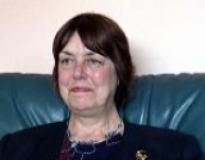Interview 30

She had two sub arachnoid haemorrhages (age 32 and 52). The first caused temporary left weakness and the second some memory problems and migraine. Medication: atenolol, lisinopril (blood pressure), co-codamol (migraine).
Is a married mother of 2 children and is a nurse trainer. Ethnic background/nationality: White/English.
More about me...
This woman has had two subarachnoid haemorrhages (bleed around the surface of the brain) one when she was 32 and one when she was 52. These are sometimes described as head injuries rather than stroke. The haemorrhages were due to a defective artery and it is quite likely that the condition is in her family as she knew of other family members who have also had haemorrhages.
She had two different sorts of operation to repair the defective arteries. The first one was clipped in open surgery and the second one was repaired with a coil inserted through a catheter. The second type of operation is now more common and she thinks was preferable as the recovery time is quicker.
She had rehabilitation after both haemorrhages to help restore her physical fitness. After the first she had some weakness in her left arm and leg. She also experienced some memory problems after both haemorrhages and has attended a memory clinic.
She recently started taking medication to control her blood pressure although it is not certain that this was the cause of the second haemorrhage.
She has got a great deal of support through 'Headway' a head injuries charity and started working as a volunteer for them. This has helped with her motivation to get back to work after the second haemorrhage.
She said that the angiogram was a weird sensation but not painful.
She said that the angiogram was a weird sensation but not painful.
So with the angiogram, do you have to have any anaesthetic or do they give you a sedative or anything?
No nothing. They like you awake so it's quite a weird sensation. As a nurse, I can watch the monitor and know exactly where they are. I can't say I actually felt the catheters because arteries don't have nerve endings for that but you can see it on the monitor and when they inject the dye, the radiologist will say, 'It will feel warm behind your right eye', and he injects the dye and you see the dye going through and, yes, it does feel warm behind your right eye but, no, no anaesthetic, no sedative, could have done with a double Scotch at the time [laughter] but fairly painless.
A charity called the Brain and Spine Foundation recommended she start using a diary to help her remember things which she found was very useful advice.
A charity called the Brain and Spine Foundation recommended she start using a diary to help her remember things which she found was very useful advice.
So last year I had a big page a day diary where I wrote down appointments and that was the first thing I looked at in the morning and it was the last thing I looked at night [laughter] to try and train myself to write things down because my husband would say, 'Could you do X, Y and Z?' and I might remember X and Y but I'd totally forget about Z and it's very frustrating and very embarrassing to be constantly reminded. I found' I found it upsetting when my daughter in particular would say, 'But I told you that already' and I did have a wee chat with her and say, 'Look, I appreciate you said it before, I'm so sorry to have to ask you again but I have forgotten, please can you tell me, you know, just tell me the days you're coming home, you don't have to give me times or anything else, it's purely to plan meals, shopping and cooking, nothing else'. So that was very frustrating but the Brain and Spine Foundation have neurological trained nurses that [sighs] take the time to listen to your concerns and nothing is too trivial for them and I, I found that a great sense of comfort that I knew I could phone somebody up and ask advice, so they were very good.

